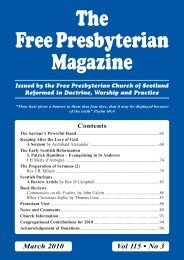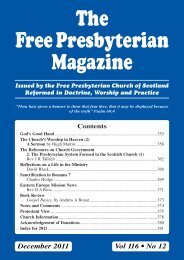February - the Free Presbyterian church of Scotland
February - the Free Presbyterian church of Scotland
February - the Free Presbyterian church of Scotland
Create successful ePaper yourself
Turn your PDF publications into a flip-book with our unique Google optimized e-Paper software.
50<br />
The <strong>Free</strong> <strong>Presbyterian</strong> Magazine<br />
which most <strong>of</strong> <strong>the</strong> godly ministers could not submit to. First, it required <strong>the</strong>m<br />
to be re-ordained if <strong>the</strong>y had not been previously ordained by a bishop. This<br />
was unacceptable because it would mean rejecting <strong>the</strong>ir actual ordination,<br />
which <strong>the</strong>y rightly considered to be absolutely valid in <strong>the</strong> sight <strong>of</strong> God.<br />
Second, ministers were required to express <strong>the</strong>ir unfeigned assent to everything<br />
in <strong>the</strong> Prayer Book.<br />
The first difficulty for ministers was that <strong>the</strong> new Prayer Book was printed<br />
only three weeks before August 24, so that it was impossible to have copies<br />
circulated to <strong>the</strong> more distant parts <strong>of</strong> <strong>the</strong> country – even Lancashire, for<br />
instance – by that date. One ejected minister pointed out afterwards that he<br />
was silenced for not declaring his consent to a book which he had not seen,<br />
and could not have seen. Wholehearted Puritans could not subscribe to a<br />
book which, for instance, taught baptismal regeneration and required ministers<br />
(1) to use <strong>the</strong> sign <strong>of</strong> <strong>the</strong> cross in baptism, (2) to reject from <strong>the</strong> Lord’s Supper<br />
all who would not receive it kneeling (a posture that implied worship <strong>of</strong> <strong>the</strong><br />
elements), (3) to believe that God has appointed bishops, priests and deacons<br />
as three distinct orders in <strong>the</strong> Church, (4) to declare that all those <strong>the</strong>y buried<br />
were regenerate (unless unbaptized, excommunicated or suicides), (5) to use<br />
readings from <strong>the</strong> Apocrypha.<br />
Fur<strong>the</strong>r, ministers were to swear obedience to <strong>the</strong>ir Bishop according to<br />
<strong>the</strong> canons <strong>of</strong> <strong>the</strong> Church, and 72 <strong>of</strong> <strong>the</strong>se canons, dating back to 1603-04<br />
were directed against Puritan positions. A minister was condemned by<br />
Canon 4, for instance, if he suggested that <strong>the</strong> Prayer Book contained<br />
“anything repugnant to <strong>the</strong> Scriptures”; by Canon 7 if he affirmed that “<strong>the</strong><br />
government <strong>of</strong> <strong>the</strong> Church <strong>of</strong> England by archbishops, bishops, deans etc is<br />
repugnant to <strong>the</strong> Word <strong>of</strong> God”. Canon 58 declared that “every minister, when<br />
<strong>of</strong>ficiating, is required to wear a surplice, under pain <strong>of</strong> suspension” (<strong>the</strong> surplice<br />
is a tunic with wide sleeves which <strong>the</strong> Puritans rejected because <strong>of</strong> its<br />
Roman Catholic associations and because it had no authority from Scripture).<br />
And Canon 68 required ministers “to baptize all children without exception”.<br />
Then <strong>the</strong>re was <strong>the</strong> matter <strong>of</strong> <strong>the</strong> Solemn League and Covenant, which<br />
many ministers had subscribed; now <strong>the</strong>y were required to declare: “I do<br />
hold <strong>the</strong>re lies no obligation upon me, or any o<strong>the</strong>r person, from <strong>the</strong> oath<br />
commonly called, The Solemn League and Covenant, to endeavour any<br />
change or alteration <strong>of</strong> government ei<strong>the</strong>r in <strong>church</strong> and state; and that <strong>the</strong><br />
same was in itself an unlawful oath, and imposed upon <strong>the</strong> subjects <strong>of</strong> this<br />
realm against <strong>the</strong> known laws and liberties <strong>of</strong> this kingdom”. Even some who<br />
had never taken this covenant could not in conscience take such an oath as<br />
was now being demanded <strong>of</strong> <strong>the</strong>m. Besides, all ministers were required to<br />
make <strong>the</strong> following political statement: “I . . . do declare that it is not lawful,

















